Recent Posts
SERVPRO of Tri-Cities West: Understanding Fire Insurance Coverage
12/5/2024 (Permalink)
If you've experienced a home fire, one of your first questions might be about insurance coverage. For most homeowners and renters, standard policies will cover the majority of damages. However, homes with unique risks may require additional measures or specialized insurance. Here’s what you need to know about protecting your property from fire damage.
What Does Standard Insurance Cover?
For many homeowners in Tri-Cities West and beyond, a standard insurance policy will cover a wide range of fire-related expenses, including:
- Home Repairs: Costs to repair structural damage to your home.
- Personal Belongings: Replacement of damaged items like furniture, electronics, and clothing.
- Lawsuit Expenses: Coverage for liability in case the fire spreads to neighboring properties.
- Additional Living Expenses: Reimbursement for temporary housing and other necessary expenses while repairs are underway.
Is Standalone Fire Insurance an Option?
For those seeking extra protection or living in unique situations, standalone fire insurance is a viable option. This type of policy offers:
- Specific Coverage: Protection against damage from fire, smoke, or explosions.
- Cost Efficiency: A narrower scope of coverage often makes these policies more affordable than standard insurance.
- Ideal for Certain Properties: Suitable for older homes, homes with a history of claims, or secondary residences like vacation homes that are vacant for extended periods.
What If Your Home Doesn’t Qualify for Standard Insurance?
In some cases, your home may be deemed high-risk and ineligible for standard coverage. Common reasons include:
- Proximity to arson-prone areas.
- Location far from fire services.
- Being near natural hazards like brush or canyons.
For these situations, government-backed insurance programs may offer a solution. These policies often have fewer restrictions and can provide essential coverage for those unable to qualify for traditional plans.
Peace of Mind After a Fire
If your property experiences fire damage, your insurance will typically cover the costs of hiring a fire restoration company like SERVPRO of Tri-Cities West to bring your home back to preloss condition. Whether through standard, standalone, or government-backed insurance, having the right coverage ensures you're prepared for the unexpected.
Protect your home and your peace of mind—because when it comes to fire damage, preparation is key.
How SERVPRO of Tri-Cities West Can Help With Claims!
12/4/2024 (Permalink)
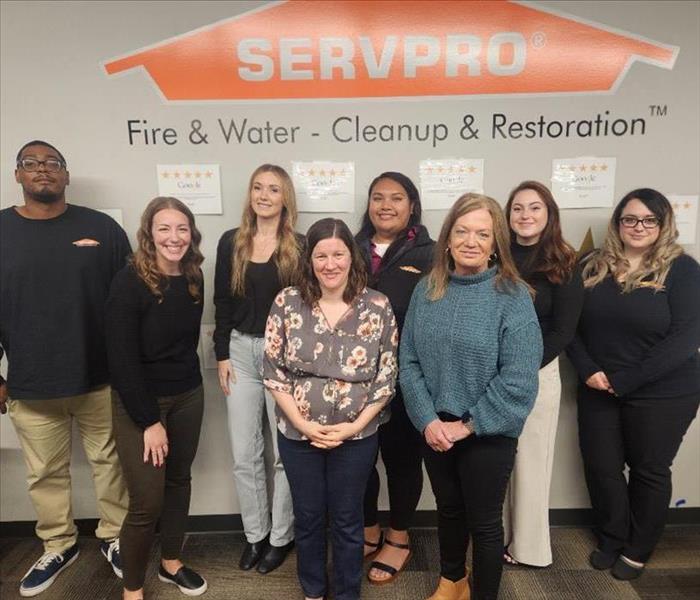 SERVPRO Claims Team
SERVPRO Claims Team
4 Ways SERVPRO of Tri-Cities West Eases the Stress of Business Disasters
Facing a disaster at your Benton City, WA, business is never easy. Whether it’s a fire, flood, or storm, the disruption to your daily operations and the added pressure of protecting your team and managing insurance claims can feel overwhelming. That’s where SERVPRO of Tri-Cities West comes in. Our expert team specializes in reducing stress and restoring normalcy. Here’s how we help business owners navigate the recovery process:
1. Rapid Emergency Response
When disaster strikes, time is of the essence. Fires, flooding, and storm damage can escalate quickly if left unaddressed. SERVPRO’s highly trained professionals are on call 24/7 to respond immediately. Our prompt action helps minimize damage, allowing your business to recover more efficiently by restoring what’s salvageable rather than replacing everything.
2. Focused Pretesting
Not everything damaged by a disaster needs to be discarded. SERVPRO technicians conduct detailed pretesting to identify items that can be restored. This not only saves money but also helps preserve the assets that matter most to your business.
3. Simplified Claims Process
Managing insurance claims doesn’t have to be a headache. With SERVPRO’s electronic claims system, business owners and insurance adjusters have access to a centralized platform that tracks all the important details. From loss information and photos to job progress and estimates, this tool ensures everyone stays informed and on the same page.
4. Certified Best Practices
Quality matters when it comes to disaster recovery. SERVPRO of Tri-Cities West ensures every project meets the strict standards of the Institute of Inspection Cleaning and Restoration Certification (IICRC). This commitment to excellence gives both business owners and insurers peace of mind, knowing the job is done right.
At SERVPRO of Tri-Cities West, we’re more than a restoration company—we’re a partner you can rely on when it matters most. Let us handle the details so you can focus on your team, your business, and moving forward.
Understanding Window Condensation and Its Impact to Your Tri-Cities West Property
11/5/2024 (Permalink)
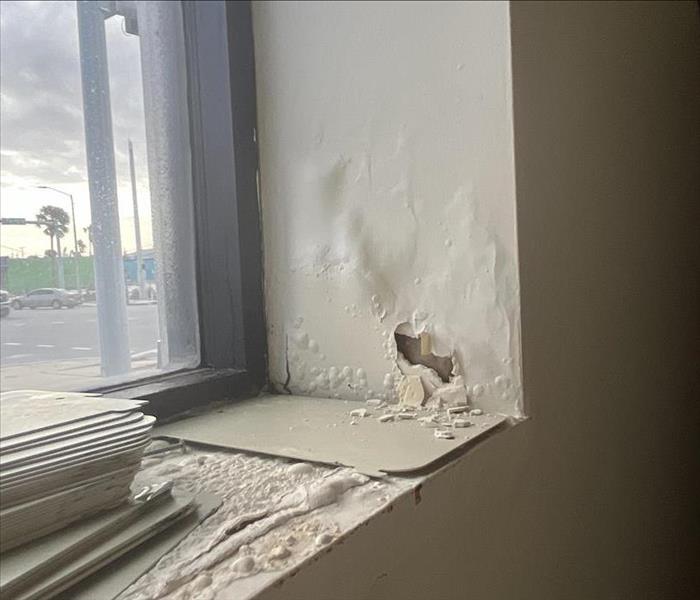 Water Damage From Window Condensation - SERVPRO Tri-Cities West and Franklin County WA
Water Damage From Window Condensation - SERVPRO Tri-Cities West and Franklin County WA
In the Tri-Cities West area, window condensation is a common issue, especially as temperatures drop. While it may seem harmless, condensation can lead to serious water damage if left untreated. SERVPRO of Tri-Cities West is here to help you understand why window condensation occurs, its potential effects, and why prompt mitigation is essential to avoid long-term damage.
Causes of Window Condensation
Condensation forms when warm, moist air inside your home meets the colder surface of your windows. This often happens in the winter months when indoor heating contrasts with chilly outdoor temperatures. Common causes include:
- High indoor humidity: Activities like cooking, showering, and laundry add moisture to the air, which can condense on windows.
- Poor ventilation: Lack of airflow increases humidity and can lead to condensation buildup on windows and other surfaces.
- Improper window insulation: Windows that are not adequately insulated or sealed can exacerbate condensation issues.
Effects of Untreated Window Condensation
If condensation on your windows goes unchecked, it can lead to several issues that may compromise your property:
- Mold Growth: Moisture from window condensation can seep into surrounding window frames, sills, and walls, creating the perfect conditions for mold to thrive. Mold not only damages property but also poses health risks.
- Damage to Window Frames and Walls: Continuous exposure to moisture can warp wooden frames, damage drywall, and weaken structural elements. Over time, this may lead to costly repairs.
- Peeling Paint and Staining: Excess moisture can cause paint to peel and unsightly stains to form around windows, impacting the aesthetic and value of your home.
Why Choose SERVPRO of Tri-Cities West for Water Damage Restoration?
At SERVPRO of Tri-Cities West, we’re equipped to address water damage at its source and restore your home to its best condition. Here’s what we offer:
- Quick Response: We’re available 24/7 to respond promptly to water damage, preventing further issues from developing.
- Comprehensive Moisture Control: Our team uses advanced moisture detection tools and drying equipment to fully mitigate water damage, even in hard-to-reach areas.
- Certified Expertise: Our trained technicians understand the unique challenges posed by condensation and water damage, providing you with effective solutions that last.
If you’re dealing with window condensation or water damage, contact SERVPRO of Tri-Cities West today. Our team is here to protect your property from the risks of moisture and ensure a safe, healthy home.
Addressing Washing Machine Leaks Quickly to Protect Your Tri-Cities West Property
11/5/2024 (Permalink)
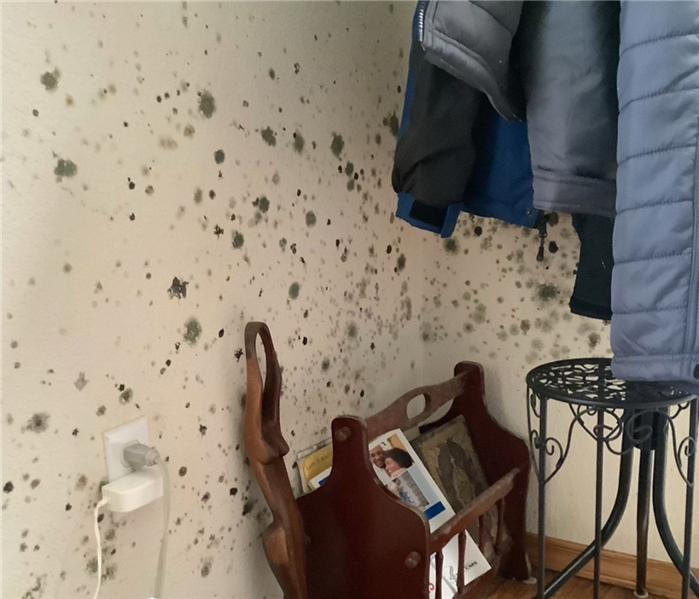 Water Damage Restoration SERVPRO of Tri-Cities West and Franklin County
Water Damage Restoration SERVPRO of Tri-Cities West and Franklin County
In Tri-Cities West, washing machine leaks are a common source of water damage in both homes and businesses. While a small leak might seem manageable at first, it can quickly lead to extensive damage if not addressed promptly. SERVPRO of Tri-Cities West is here to explain the causes, potential impacts, and importance of timely water damage mitigation when dealing with washing machine leaks.
Causes of Washing Machine Leaks
Washing machines can leak for various reasons, some of which may not be immediately obvious. Common causes include:
- Worn-out hoses: Washing machine hoses can degrade over time, leading to small cracks or breaks that result in leaks.
- Overloaded machine: Putting too much laundry into your machine can cause strain, increasing the chance of water escaping.
- Faulty seals: Seals in the washing machine tub can wear out, allowing water to leak out onto your floor.
- Improper installation: Incorrectly installed hoses or connections can result in slow but consistent leaks.
Effects of Untreated Washing Machine Water Damage
Leaving water damage from a washing machine unattended can lead to severe consequences, including:
- Mold Growth: Moisture from a leak creates an ideal environment for mold, which can spread rapidly to walls, flooring, and nearby belongings. Mold not only damages property but also poses health risks.
- Structural Damage: Prolonged exposure to moisture can weaken floors, especially if the washing machine is located on an upper level. Leaks can also compromise drywall and wooden structures, leading to costly repairs.
- Damage to Flooring and Surrounding Areas: Water from a leaking washing machine can seep into flooring, damaging carpets, tiles, or hardwood. If not mitigated, it can extend into surrounding areas, increasing the scope of the restoration needed.
SERVPRO of Tri-Cities West: Your Local Water Damage Experts
SERVPRO of Tri-Cities West understands the urgency required for washing machine-related water damage. We provide:
- 24/7 Emergency Response: Our team is available around the clock to address water damage as soon as it occurs, helping prevent further complications.
- Advanced Drying and Moisture Control: Using specialized equipment, we ensure affected areas are thoroughly dried and dehumidified, minimizing the risk of mold.
- Professional Expertise: Our certified technicians have extensive experience handling water damage from all sources, ensuring your property is restored efficiently and effectively.
If you’re dealing with water damage from a washing machine leak, don’t wait. Contact SERVPRO of Tri-Cities West for prompt, professional water restoration and to protect your home from further damage.
Protecting Your Tri-Cities West Property This Rainy Season
11/5/2024 (Permalink)
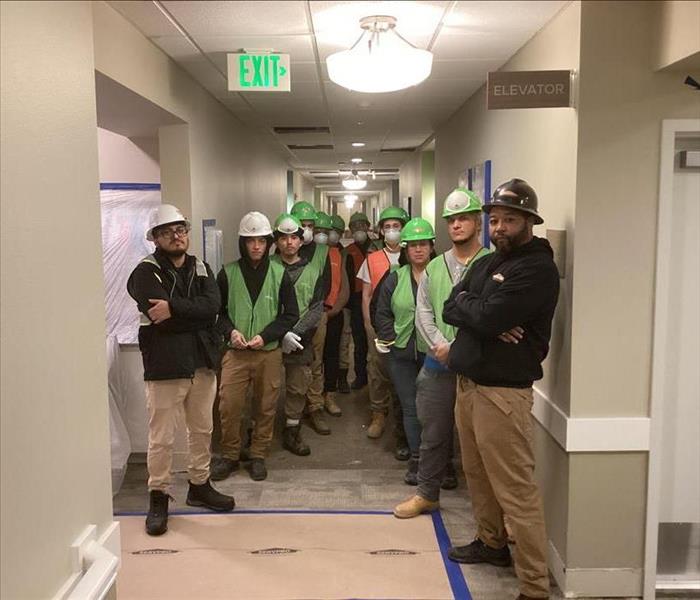 SERVPRO of Tri-Cities West and Franklin County Water Damage Restoration Team - Team Friermuth
SERVPRO of Tri-Cities West and Franklin County Water Damage Restoration Team - Team Friermuth
As the rainy season settles in across Tri-Cities West, the risk of water damage rises with it. Heavy rain, leaks, and flooding can quickly lead to costly damage if not addressed immediately. SERVPRO of Tri-Cities West is here to help, offering professional water damage restoration services to protect your property and restore peace of mind.
Why Choose SERVPRO for Water Damage?
- Rapid Response, Anytime: Water damage can worsen quickly, so a fast response is critical. Our team is available 24/7/365 to respond, assess the situation, and begin restoration right away.
- Advanced Water Extraction and Drying: SERVPRO uses industry-leading technology to remove water, dry affected areas, and dehumidify your property. From powerful pumps to high-speed air movers, we ensure moisture is thoroughly eliminated to prevent mold and further damage.
- Certified and Experienced Team: Our technicians are highly trained in water damage restoration and work with the utmost care to get your home or business back to normal. We’re experienced with all types of water damage scenarios, big or small.
- Help with Insurance: Dealing with insurance claims can be overwhelming during a stressful time. We coordinate directly with your insurance company to streamline the claims process, making recovery easier for you.
Protecting Your Property This Rainy Season
With extensive experience in water restoration, SERVPRO of Tri-Cities West is dedicated to restoring homes and businesses affected by the elements. Whether it’s a minor leak or a major flood, we’re here to help make it Like it never even happened.
For professional water damage restoration, call SERVPRO of Tri-Cities West today. We’re here to keep your property safe and dry all season long!
The Power of a National Network Right Here in Tri-Cities West
11/5/2024 (Permalink)
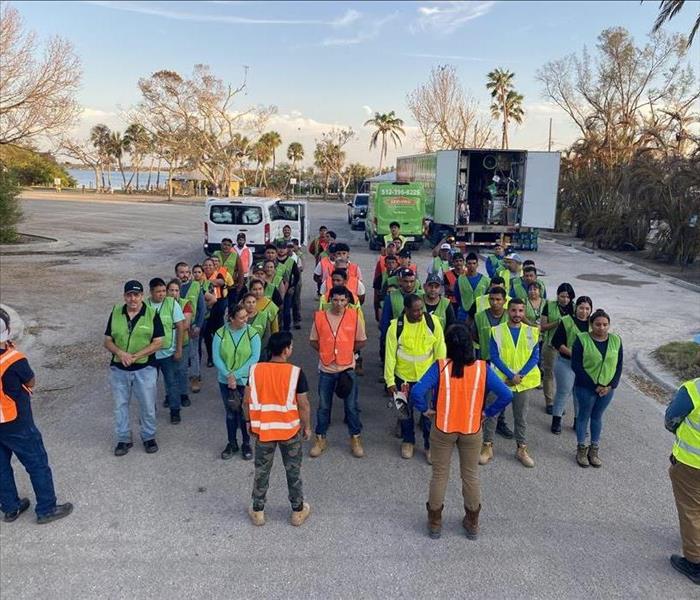 The Power of SERVPRO's National Network of Water Damage Restoration Professionals. SERVPRO of Tri-Cities West and Franklin County
The Power of SERVPRO's National Network of Water Damage Restoration Professionals. SERVPRO of Tri-Cities West and Franklin County
When disaster strikes, having a trusted restoration partner with the resources, equipment, and personnel to respond quickly and effectively is essential. SERVPRO of Tri-Cities West is not just your local go-to for restoration needs; we’re also part of a nationwide team with the ability to scale up for any size disaster. With our recent team deployments to assist with the aftermath of Hurricanes Helene and Milton, we’re reminded of the powerful support we bring to every community we serve, including Tri-Cities West.
A Nationwide Team, Locally Dedicated
As a locally owned and operated SERVPRO franchise, we’re committed to serving the Tri-Cities West community. But our connection to the larger SERVPRO network means we can bring national resources directly to our area when major disasters occur. In times of crisis, we can call on additional personnel, specialized equipment, and expertise from SERVPRO teams across the country.
Faster to Any Size Disaster
SERVPRO’s rapid response capability is one of the reasons we stand out. With our highly trained technicians and top-of-the-line equipment, we’re able to respond immediately to any disaster, whether it’s a local flooding event or widespread hurricane damage. During Hurricanes Helene and Milton, SERVPRO of Tri-Cities West dispatched team members and equipment to support restoration efforts, demonstrating our readiness and commitment to helping communities recover swiftly and completely.
Comprehensive Restoration Solutions
From water and fire restoration to mold remediation and specialized cleaning, we handle all aspects of the recovery process. This comprehensive approach means you don’t need to coordinate multiple service providers during a stressful time. Instead, we streamline the entire process to make it "Like it never even happened."
Local Service, National Strength
SERVPRO of Tri-Cities West offers the personalized, local service you expect from a community-based business, backed by the strength and resources of a national network. Whether it’s a minor incident or a large-scale disaster, we have the personnel and equipment to help you restore your property to its pre-damage condition.
If you’re facing property damage, contact SERVPRO of Tri-Cities West. Our team is ready to provide expert restoration services, backed by a powerful network, right here in your community.
The Silent Threat: How Water Leaks Impact Businesses and What You Can Do About It
3/5/2024 (Permalink)
Water leaks are often overlooked, yet they pose a significant risk to businesses of all sizes. In fact, water leaks are the most common form of loss reported by businesses, and their consequences can be far-reaching. Let's explore the effects of water leaks on businesses and how SERVPRO of Tri-Cities West can help mitigate the damage and minimize downtime.
Water leaks can cause extensive damage to property, including structural damage to buildings, flooring, walls, and equipment. The presence of water can lead to mold growth, compromising indoor air quality and posing health risks to employees and customers alike.
The cost of water damage can be substantial, encompassing repair and restoration expenses, as well as potential fines for non-compliance with building codes and regulations. Additionally, insurance premiums may increase following a water damage claim, further adding to the financial burden on businesses.
Perhaps the most significant impact of water leaks on businesses is the disruption to operations and business downtime. Water damage can force businesses to close temporarily, resulting in lost productivity, missed deadlines, and dissatisfied customers. The longer the downtime, the greater the potential loss in revenue and reputation damage.
At SERVPRO of Tri-Cities West, we understand the urgency of addressing water leaks promptly and effectively. Our team of highly trained professionals is equipped with advanced technology and expertise to handle water damage restoration quickly and efficiently. We offer 24/7 emergency response services to mitigate further damage and minimize business interruption.
In addition to water damage restoration, SERVPRO of Tri-Cities West provides comprehensive mold remediation services to address any mold growth resulting from water leaks. Our goal is not only to restore your property to its preloss condition but also to ensure a safe and healthy environment for your employees and customers.
With SERVPRO of Tri-Cities West by your side, you can rest assured that your business is in good hands. Don't let water leaks jeopardize your business's success—contact us today for fast, reliable, and professional water damage restoration services.
Remember, when it comes to water damage, swift action is crucial. Trust SERVPRO of Tri-Cities West to handle the aftermath of water leaks and minimize downtime for your business.
Restoring Homes, Restoring Lives: Why SERVPRO is Your Trusted Partner
12/1/2023 (Permalink)
When disaster strikes, whether it's a burst pipe, a fire, or a mold infestation, the impact on your home can be devastating. In these challenging moments, you need a restoration partner you can trust to bring your home back to life quickly and efficiently. Enter SERVPRO, the industry leader in restoration services. With a reputation built on trust, experience, and a commitment to excellence, here's why choosing SERVPRO is the best decision you can make for your home.
- Available Around the Clock
Disasters don't wait for a convenient time to strike, and neither does SERVPRO of Tri-Cities West. Our 24-hour emergency service ensures that we're always ready to respond to your call. Whether it's the middle of the night or during a holiday weekend, our highly trained restoration technicians are on standby, ready to deploy to your location and start the restoration process immediately.
- Highly Trained Professionals
When it comes to restoring your home, experience matters. SERVPRO's team of restoration technicians undergoes rigorous training to handle a variety of situations. From water damage and fire restoration to mold remediation and storm response, our professionals have the expertise needed to tackle any disaster. You can trust that your home is in capable hands.
- Faster to Any Sized Disaster
Time is of the essence when it comes to restoration. SERVPRO's commitment to being "Faster to Any Sized Disaster" is not just a slogan; it's a guarantee. Our extensive network of over 2,000 franchises means that we have the resources and manpower to respond swiftly, no matter the scale of the disaster. We understand that a quick response can minimize damage and expedite the restoration process, allowing you to return to your home faster.
- Cutting-Edge Equipment & Technology
SERVPRO of Tri-Cities West stays ahead of the curve with advanced restoration and cleaning equipment. Our investment in state-of-the-art technology allows us to provide efficient and effective services. Whether it's water extraction, fire damage cleanup, or mold remediation, we use the latest tools to ensure that your home is restored to its pre-disaster condition.
Restoration Services Tailored to Your Needs
At SERVPRO of Tri-Cities West, we understand that every home and every disaster is unique. That's why our residential restoration services are comprehensive and tailored to meet your specific needs. Our core services include:
- Water Damage Restoration
- Fire Damage Restoration
- Mold Remediation
- Storm and Major Events
Cleaning Services for Your Safety and Comfort
Beyond restoration, SERVPRO of Tri-Cities West offers a range of residential cleaning services designed to maintain a safe, clean, and comfortable living environment for your family. Our cleaning services cover:
- Air Ducts & HVAC
- Biohazard Cleanup
- Carpet and Upholstery Cleaning
- Ceiling, Floors & Walls
- Drapes and Blinds Cleaning
- Odor Removal
- Sewage and Toilet Overflow Cleanup
- Trauma and Crime Scene Cleanup
- Vandalism and Graffiti Removal
When disaster strikes, SERVPRO of Tri-Cities West is the name you can trust to restore your home and your peace of mind. With a commitment to excellence, 24/7 availability, highly trained professionals, and cutting-edge equipment, we are dedicated to making your house feel like home again. Choose SERVPRO of Tri-Cities West for restoration services that go beyond expectations, bringing comfort and security back to your life.
Discover the Expertise of SERVPRO of Tri-Cities West in Fire and Water Restoration
11/16/2023 (Permalink)
As a premier fire and water restoration and cleanup company, SERVPRO of Tri-Cities West stands out for its commitment to excellence. Our team comprises highly trained water damage specialists equipped with cutting-edge drying equipment and techniques. Delve into the details below to learn about our comprehensive training programs and the advanced equipment we employ.
High-Level Training
At SERVPRO, we prioritize the development of our personnel to ensure they excel as specialists in the field. Our confidence in addressing customer needs efficiently and effectively is founded on the extensive training our employees undergo. The training includes:
- IICRC Training
- Employee Certification Training
- Initial Franchise Training
- e-Learning Modules
- Continuing Education Classes
State-of-the-Art Equipment
Equipped with the latest technology, SERVPRO ensures optimal service for our customers. The utilization of advanced equipment translates to quicker turnaround times, cost savings, and overall satisfaction for both the customer and our team. Explore some of the state-of-the-art technology at our disposal:
- Moisture Detection and Measurement Equipment
- Water Extraction Equipment
- Drying Equipment
- Odor Removal and Deodorization Tools
- Sanitizing Agents, Germicides, and Anti-Microbial Treatments
SERVPRO of Tri-Cities West specializes in fire and water damage restoration, providing round-the-clock assistance. Whether you require immediate help or want to learn more, reach out to us at (509) 943-9290 or visit our website. We are always Here to Help!
The List of Who to Call After Storm Damage
11/16/2023 (Permalink)
In the aftermath of storm-induced flooding in your Tri-Cities/Franklin County residence, it's crucial to connect with various professionals and services to address the situation effectively. Below is a compilation of essential contacts to consider:
1. Emergency Services: In cases of immediate threats to safety, such as structural collapse or electrical hazards, reach out to your local emergency services or dial 911 promptly.
2. Insurance Company: Initiate the claims process by promptly notifying your insurance company about the storm damage. They will guide you through the necessary steps and may offer recommendations for reliable restoration services.
3. Water Damage Restoration Company: Engage the services of a professional water damage restoration company, specializing in managing water-related emergencies. These experts can evaluate the damage extent, extract water, dry and dehumidify affected areas, and carry out essential repairs. Additionally, they can assist with mold remediation if required.
4. Electrician: If your home's electrical system is compromised or if you suspect electrical damage, contact a licensed electrician. Refrain from interacting with electrical components or standing water in affected areas until a professional has assessed the situation.
5. Plumber: In cases where flooding results from plumbing issues, such as burst pipes, enlist the services of a licensed plumber. They can repair the source of water damage and prevent potential future problems.
6. Local Authorities: Depending on the severity of storm damage and flooding, inform local authorities, including municipal or county offices, to report the situation and seek necessary permits or assistance.
Always prioritize your safety. In case of evacuation or immediate risks, follow the guidance of local authorities and emergency services. Once your safety is ensured, contact SERVPRO of Tri-Cities West/SERVPRO of Franklin County at (509) 943-9290 for immediate assistance. To learn more, visit our website. Your safety is our priority!

 24/7 Emergency Service
24/7 Emergency Service




